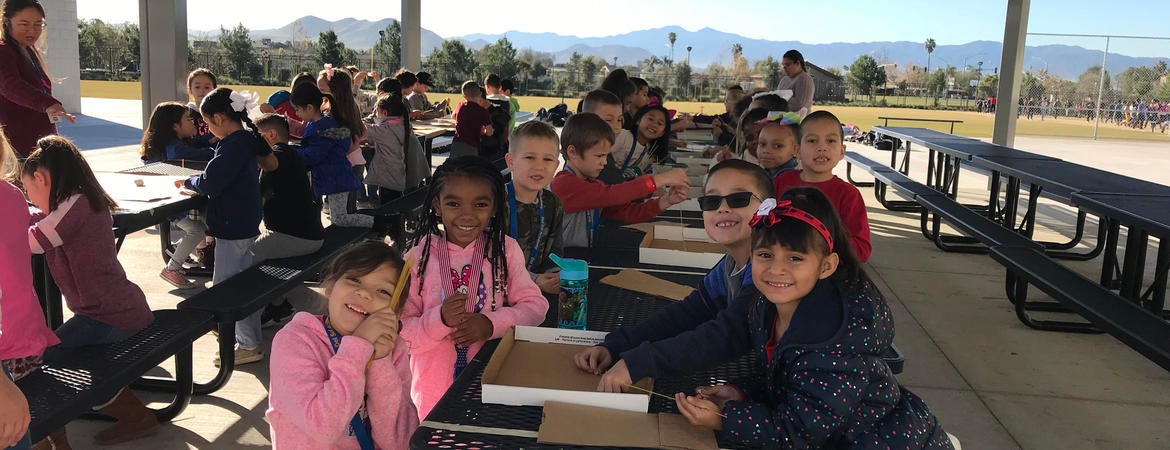
Three years ago, NASA’s Jet Propulsion Laboratory, or JPL, joined forces with UC Riverside’s Graduate School of Education to bring science, technology, engineering, and mathematics, or STEM, programming to schools throughout the region.
The partnership began when NASA selected UCR Assistant Professor of Teaching Cathy Lussier as a faculty team leader for NASA’s Minority University and Research Education Project, a program aimed at providing minority-serving institutions with awards and resources. Along with a team of student teachers, Lussier officially kicked off the partnership by attending a weeklong summer institute at the Jet Propulsion Laboratory in Pasadena, the results of which left lasting impressions.
“The NASA JPL experts and I worked together that week to help ensure my student team had fun making active connections between learning theories and some pretty great hands-on STEM activities that they could then take into their own classrooms,” Lussier said. “By the end of that week, you could palpably feel thestudents gain confidence in themselves as future science educators as a product of the work we were doing in refining their science teaching skills using those NASA resources.”
Shaped by Lussier and NASA JPL education specialists Brandon Rodriguez and Paula Partida, the collaboration with UCR now includes daylong, on-campus immersive development workshops for future teachers. Student teachers are also given access to NASA resources and educational materials that implement Next Generation Science Standards (NGSS), as well as opportunities to participate in summer institutes at the Jet Propulsion Laboratory and NASA’s Neil A. Armstrong Flight Research Center, located at Edwards Air Force Base.
Although federal funding for these educational programs was abruptly cut in 2018, the Graduate School of Education stepped in to safeguard the continuation of those already planned throughout inland Southern California. The result is an expanded partnership that provides support for 34 K-12 student and teacher workshops at local schools, and even honors standing workshops the Jet Propulsion Laboratory had set up with schools that weren’t part of UCR’s original partnership or where UCR alumni are currently teaching.
“NASA provides great resources and programs implementing Next Generation Science Standards, and I am excited that UCR can help provide students and educators throughout the region with the opportunity to learn these tools,” said Thomas M. Smith, dean of UCR’s Graduate School of Education.
The workshops range from professional development sessions to school visits designed to get K-12 students and educators alike more excited about science education. One recent session geared toward student teachers enrolled in UCR’s teacher education program focused on lunar and meteorite training and certification, for example.
This past month, meanwhile, recent alumna and first-year teacher Leah Dawdy organized a STEM development workshop at Del Sol Academy, part of the Jurupa Unified School District. During the event, 110 first-graders got a crash course in engineering principles as they built marshmallow lunar landers and spaghetti towers. The idea was to get students not only interested in exploring science and engineering, but also involved in practicing important skills such as making predictions, collecting data in the form of observations, evaluating outcomes, and suggesting revisions.
“What I've always valued about working with UCR is the implicit understanding that we are part of a team,” said Rodriguez, NASA education specialist. “Participants at UCR events walk through the door with the understanding that a workshop is just the first step of a collaboration that will span their teaching careers. For the past three years, it has been clear to me that we're not simply creating events; we're shaping a strategy for impactful science instruction.”
Lussier added, “When you consider that UCR has a long history of educational research and pedagogical knowledge, and NASA JPL has the diverse STEM content experts and Next Generation Science Standard educational specialists, it just feels, three years in, like an obvious and natural collaboration to come together to help students using our shared expertise.”